| Listing 1 - 10 of 18 | << page >> |
Sort by
|
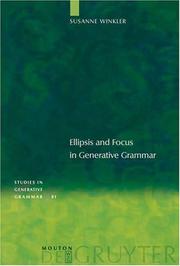
ISBN: 9783110890426 3110890429 3110186012 9783110186017 Year: 2005 Publisher: Berlin Mouton de Gruyter
Abstract | Keywords | Export | Availability | Bookmark
 Loading...
Loading...Choose an application
- Reference Manager
- EndNote
- RefWorks (Direct export to RefWorks)
Covering linguistic research on empty categories over more than three decades, this monograph presents the result of an in-depth syntactic and focus-theoretical investigation of ellipsis in generative grammar. The phenomenon of ellipsis most generally refers to the omission of linguistic material, structure and sound. The central aim of this book is to explain on the basis of linguistic theorizing of how it is possible that we understand more than we actually hear. The answer developed throughout this book is that ellipsis is an interface phenomenon which can only be explained on the basis of the complex interaction between syntax, semantics and information structure. Scholars of grammar and cognitive scientists will profit from reading this book.
Grammar --- Focus (Linguistics) --- Generative grammar --- Grammar, Comparative and general --- Ellipsis --- Generative grammar. --- Ellipsis. --- Ellipsis (Language). --- Generative Linguistics.
Book
ISBN: 9027228000 1588116247 9786612156793 1282156799 9027294518 9789027294517 9789027228000 Year: 2005 Volume: 76 Publisher: Amsterdam Philadelphia John Benjamins Pub. Co.
Abstract | Keywords | Export | Availability | Bookmark
 Loading...
Loading...Choose an application
- Reference Manager
- EndNote
- RefWorks (Direct export to RefWorks)
This collection of original research focuses on various lesser studied aspects of Greek syntax. The articles combine a sound empirical coverage within current developments of generative theory and cover a wide spectrum of areas. The syntax of sentential structure is dealt with by two articles, one is an extensive analysis of the distribution of goal and beneficiary dative DPs in Greek (and cross-linguistically) and the other addresses the relation agree in small clauses (and between adjectives and nouns). Two articles study the acquisition of the left periphery and of eventivity and one focuses on the historical evolution of participles in Greek, out of which gerunds emerged. The syntax and semantics of wh-clauses in DP positions and of the non-volitional verb θelo are the focus of two articles situated in the syntax-semantics interface. The DP domain is approached by two theoretical articles, one on a Greek possessive adjective and another on determiner heads. The final contribution studies the acquisition of the Greek definite article.
Greek language, Modern --- Romaic language --- Syntax. --- Grammar, Generative. --- Greek language [Modern ] --- Syntax --- Generative grammar --- Grammar, Generative
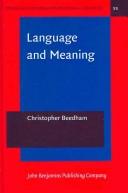
ISBN: 1282156217 9786612156212 9027293929 9789027293923 9789027215642 9027215642 9789027215697 Year: 2005 Publisher: Amsterdam Benjamins
Abstract | Keywords | Export | Availability | Bookmark
 Loading...
Loading...Choose an application
- Reference Manager
- EndNote
- RefWorks (Direct export to RefWorks)
Structural linguistics. --- Generative grammar. --- Russian language --- German language --- Grammar, Comparative and general --- Grammar, Generative --- Grammar, Transformational --- Grammar, Transformational generative --- Transformational generative grammar --- Transformational grammar --- Psycholinguistics --- Linguistics --- Grammar, Comparative --- German. --- Russian. --- Derivation --- Lexicology. Semantics --- Grammar --- Comparative linguistics
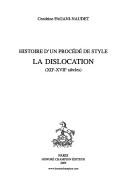
Abstract | Keywords | Export | Availability | Bookmark
 Loading...
Loading...Choose an application
- Reference Manager
- EndNote
- RefWorks (Direct export to RefWorks)
French language --- Generative grammar --- Français (Langue) --- Grammaire générative --- Syntax --- Syntaxe --- Français (Langue) --- Grammaire générative --- Style --- History
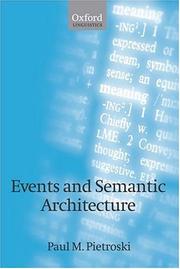
ISBN: 0199244316 9780199244317 9780199244300 0199244308 1280753552 9786610753550 1429492694 0191529559 0191714151 Year: 2005 Publisher: Oxford Oxford University Press
Abstract | Keywords | Export | Availability | Bookmark
 Loading...
Loading...Choose an application
- Reference Manager
- EndNote
- RefWorks (Direct export to RefWorks)
This book explores how grammatical structure is related to meaning. The meaning of a phrase clearly depends on its constituent words and how they are combined. But how does structure contribute to meaning in natural language? Does combining adjectives with nouns (as in 'brown dog') differ semantically from combining verbs with adverbs (as in 'barked loudly')? What is the significance of combining verbs with names and quantificational expressions (as in 'Fido chased every cat')? Inaddressing such questions, Paul Pietroski develops a novel conception of linguistic meaning according to which the
801.56 --- 801.56 Syntaxis. Semantiek --- Syntaxis. Semantiek --- #KVHA:Semantiek --- Causation --- Generative grammar --- Language and languages --- Meaning (Philosophy) --- Structuralism --- Structure (Philosophy) --- Philosophy --- Whole and parts (Philosophy) --- Form (Philosophy) --- Poststructuralism --- Semantics (Philosophy) --- Grammar, Comparative and general --- Grammar, Generative --- Grammar, Transformational --- Grammar, Transformational generative --- Transformational generative grammar --- Transformational grammar --- Psycholinguistics --- Causality --- Cause and effect --- Effect and cause --- Final cause --- Beginning --- God --- Metaphysics --- Necessity (Philosophy) --- Teleology --- Derivation --- Lexicology. Semantics --- Grammar --- Generative grammar. --- Structuralism. --- Causation. --- Philosophy.

ISBN: 1282096990 9786612096990 0262278324 1423746821 9780262278324 9781423746829 9780262122757 0262122758 9780262621915 0262621916 Year: 2005 Publisher: Cambridge, Mass. MIT Press
Abstract | Keywords | Export | Availability | Bookmark
 Loading...
Loading...Choose an application
- Reference Manager
- EndNote
- RefWorks (Direct export to RefWorks)
Grammar, Comparative and general --- Lexical grammar. --- Morphosyntax. --- Word formation. --- Derivational morphology --- Word formation --- Morphosyntactic features --- Morphosyntax --- Derivation --- Generative grammar --- Lexicology --- Morphology --- Syntax --- Grammar --- Linguistics --- Philology
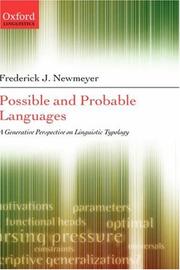
ISBN: 0199274347 9780199274345 0199274339 9780199274338 9786611198411 0191534404 1435622820 1281198412 0191706477 Year: 2005 Publisher: Oxford Oxford University Press
Abstract | Keywords | Export | Availability | Bookmark
 Loading...
Loading...Choose an application
- Reference Manager
- EndNote
- RefWorks (Direct export to RefWorks)
In this important and pioneering book Frederick Newmeyer seeks to explain the variety of languages. He combines the leading ideas of the functionalist and formalist approaches to linguistic typology, advocating principles of Universal Grammar to explain why some language types are impossible, and functional principles to explain why some grammatical features are more common than others.
Grammar --- 800.8 --- Taalklassen. Taalsoorten. Soorten talen. Talen: typologie --- Functionalism (Linguistics) --- Generative grammar. --- Grammar, Comparative and general. --- Typology (Linguistics) --- 800.8 Taalklassen. Taalsoorten. Soorten talen. Talen: typologie --- Functionalism (Linguistics). --- Typology (Linguistics). --- Generative grammar --- Grammar, Comparative and general --- Functional analysis (Linguistics) --- Functional grammar --- Functional linguistics --- Functional-structural analysis (Linguistics) --- Grammar, Functional --- Grammatical functions --- Linguistics --- Structural linguistics --- Language and languages --- Linguistic typology --- Linguistic universals --- Grammar, Generative --- Grammar, Transformational --- Grammar, Transformational generative --- Transformational generative grammar --- Transformational grammar --- Psycholinguistics --- Comparative grammar --- Grammar, Philosophical --- Grammar, Universal --- Philosophical grammar --- Philology --- Typology --- Classification --- Derivation --- Grammar, Comparative
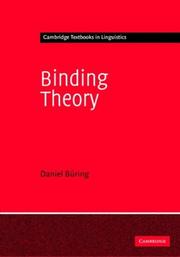
ISBN: 0521812801 0521012228 9780521012225 9780521812801 9780511802669 051108112X 9780511081125 0511080360 9780511080364 0511802668 1107133041 9781107133044 1282394169 9781282394162 0511643675 9780511643675 9786612394164 6612394161 0511196733 9780511196737 978051108112X 051156161X Year: 2005 Volume: *55 Publisher: Cambridge Cambridge University Press
Abstract | Keywords | Export | Availability | Bookmark
 Loading...
Loading...Choose an application
- Reference Manager
- EndNote
- RefWorks (Direct export to RefWorks)
Binding theory seeks to explain how different kinds of nominal expressions such as names, noun phrases and pronouns have anaphoric relations amongst one another, and how they come to have reference to things in the world. This textbook provides a thorough and comprehensive introduction to modern binding theory. Starting at a very basic level, it introduces the reader to a huge variety of nominal and especially pronominal expressions from the world's languages, the ways they can be used, and current theorising about their grammatical properties and their interpretation. Daniel Büring discusses a wide range of cross-linguistic data and theoretical approaches, and unlike in existing introductions, pairs the discussion of syntactic facts with a detailed introduction to the semantic interpretation of binding structures. Written in a clear and accessible style, and with numerous exercises and examples, this textbook will be invaluable to graduate and advanced undergraduate students of syntax and semantics.
Lexicology. Semantics --- Grammar --- Government-binding theory (Linguistics) --- 801.56 --- Syntaxis. Semantiek --- 801.56 Syntaxis. Semantiek --- Binding theory (Linguistics) --- Government and binding (Linguistics) --- Generative grammar --- Linguistics --- Arts and Humanities --- Language & Linguistics --- Théorie du gouvernement et du liage (linguistique)
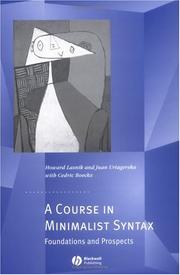
ISBN: 0631199888 063119987X 9780631199885 9780631199878 Year: 2005 Volume: 8 Publisher: Malden, Mass. Blackwell
Abstract | Keywords | Export | Availability | Bookmark
 Loading...
Loading...Choose an application
- Reference Manager
- EndNote
- RefWorks (Direct export to RefWorks)
Grammar, Comparative and general --- Minimalist theory (Linguistics) --- Generative grammar --- Language and languages --- Syntax --- Grammar --- Minimalist theory (Linguistics). --- Syntax. --- Linguistics --- Philology --- Grammar, Comparative and general - Syntax. --- Grammar, Comparative and general Syntax
Book
ISBN: 1281294462 9786611294465 1847143369 9781847143365 Year: 2005 Publisher: New York London Continuum
Abstract | Keywords | Export | Availability | Bookmark
 Loading...
Loading...Choose an application
- Reference Manager
- EndNote
- RefWorks (Direct export to RefWorks)
This book provides a broad overview of parameter-setting theory in first and second language acquisition and refines the theory by revisiting and challenging the traditional assumptions that underlie it, based on cross-linguistic language data that cover a range of syntactic and phonological phenomena.From an historical perspective on parameter-setting theory to an introduction to its role in computational linguistics, neurolinguistics, and language change, the reader will find a critique of the most commonly made arguments, as well as an index of all the syntactic, phonological, lexical, and
Language acquisition. --- Principles and parameters (Linguistics) --- Generative grammar --- Grammar, Comparative and general --- Acquisition of language --- Developmental linguistics --- Developmental psycholinguistics --- Language and languages --- Language development in children --- Psycholinguistics, Developmental --- Interpersonal communication in children --- Psycholinguistics --- Acquisition
| Listing 1 - 10 of 18 | << page >> |
Sort by
|

 Search
Search Feedback
Feedback About UniCat
About UniCat  Help
Help News
News